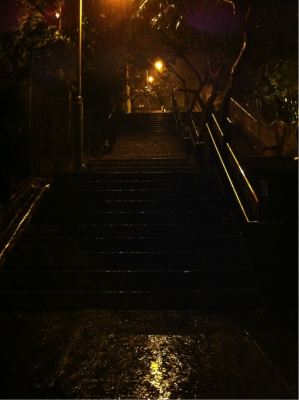I’m forty feet above the ground hanging, onto a palm frond for my life, and Batiota wants me to go higher. He motions for me to take my foot from the palm’s trunk and place it on the fronds above. I hesitate and give him a look that must be something between, What am I doing up here? and Why are you trying to kill me? Palm fronds grow green from the top, but whither and fall from below, so all I can see to step on is a dying frond, connected by nothing more than a thin, brown-red scar.
Amy Brill on Fires in Nantucket, 19th-Century Sexuality, and the First Female Astronomer
S. TREMAINE NELSON interviews AMY BRILL
Amy Brill’s articles, essays, and short stories have appeared or are forthcoming in One Story, Redbook, Real Simple, Salon, Guernica, and Time Out New York, among many others. Her debut novel The Movement of the Stars was published by Riverhead Books in April. This month she chatted with S. Tremaine Nelson about the island of Nantucket, historical fiction, and the first American female astronomer, Maria Mitchell, who shares characteristics with Hannah Price, the heroine of Brill’s novel.

S. Tremaine Nelson (SN): You were raised in New York City. Do you identify with a particular hometown neighborhood?
Amy Brill (AB): I strongly identify with the neighborhood I grew up in, Corona, Queens. It was like living in a mini UN, and it was the place I learned how to talk to anyone.
SN: What was the first book that made you say “wow!” out loud?
AB: I can’t remember the name — I was probably in third or fourth grade, and it was a YA book in which a young boy’s friend had died; I vaguely recall it being a case of playing on the train tracks, falling or being hit. What I do remember, vividly, is the gut-punch of the scene, how visceral my sorrow was for this fictional boy and his lost friend. It was the first time a book made me cry.
Tess Taylor’s “The Forage House”
DIANA BABINEAU interviews TESS TAYLOR

Today we celebrate the publication of Tess Taylor’s The Forage House with two new poems from her debut collection (“Official History”, “Southampton County Will 1745”), complete with audio recordings. In the following interview with Diana Babineau, Taylor talks about personal ancestry, American roots, and slavery, as she attempts to uncover what remains of a broken past.
Hooverville
By SAHIBA GILL
1.
Over the past forty years, Industrial Realty Group has acquired over a billion dollars of America’s obsolete industrial complexes, former military bases, and corporate campuses for retrofitting, conversion, and privatization. In 2007, the firm acquired the newly closed Hoover Plant, two blocks from my high school. Hoover once made the world’s most famous vacuums, and its old headquarters are still tremendous, a magnificent crowd of red brick and white windowpanes that run along a green lawn and announce themselves in white letters, “The Home of Hoover Fine Appliances.”
Deluge
By KEANE SHUM

I got caught in a deluge the other night, and when it hit me, it hit me just like that, italicized, like the rain was coming down so hard even the words to describe it were soaked and falling to the ground. I was in the back streets of Sheung Wan, an old part of town on the outskirts of Central that rests against the side of a hill. Steep stone staircases run up and down and through the area, and on a sunny Sunday morning you can play snakes and ladders with the past, sliding down to a street of antique stores that sell Bruce Lee posters from the 60s and twin-lens reflex cameras from the 30s, or climbing up to peek inside the few Edwardian mansions that remain, the once proud homes not of colonial officials, but of the Chinese compradors who even then—or maybe especially then—had a thing about putting the white man in his place.
Burn Everything
Speaking of Southern Illinois and fishing and smoking cigars and praying when you don’t believe in anything, I got a call last week from my neighbor Larry who was having a porn barbecue. “Every year is a gift,” he told me, when he turned thirty-four. That was forty years ago. He was always convinced he’d die young, or die middle-aged, or die a few weeks after he retired. He’d more or less been planning on it forever. In the past five years he’d sold his books. He’d sold his collection of toy figures. He’d burned most of his poems. “Nothing I can do about the published ones,” he’d said. “That’s my own little punishment from God.”
Review: River Inside the River
Book by GREGORY ORR
Reviewed by
 Gregory Orr is a meditative poet. In his new book, River Inside the River, Orr again turns his inner eye to the power of words to reveal the essence of a thing, a movement, an emotion. He writes:
Gregory Orr is a meditative poet. In his new book, River Inside the River, Orr again turns his inner eye to the power of words to reveal the essence of a thing, a movement, an emotion. He writes:
River inside the river.
World within the world.All we have is words
To reveal the rose
That the rose obscures.
River Inside the River is a sequel to and extension of his 2005 collection Concerning the Book That is the Body of the Beloved. This is especially true in the third section, which bears the book’s title.
The Cave
By DREW CALVERT

On my final day in Malaysia I visited the Great Cave near the town of Niah, site of the oldest human remains in all of Southeast Asia. To get there, I took a bus from Miri, a city not far from the Brunei border, which brought me close to the main entrance of an unceremonious national park. At the museum, I glanced through photos of Englishmen joylessly separating ceramic from bone, and I studied brochures on the local economy, which runs on bird’s nests and guano. Then I walked through a rainforest thick with cicadas until I reached the mouth of the cave, which looked like a secret airport hangar or a decommissioned gateway to hell. Armed with a flashlight and an outdated map, I followed a mossy path through the darkness and breathed in the prehistoric funk. By sunset, I found myself back at the entrance, where swiftlets and bats converged on each other in a giant black cloud above my head.
Driving Lessons
My old man taught me to drive on Sundays, usually when he was drunk. I was fifteen and he was a big shot on the Pearl Harbor Naval Shipyard, the head engineer of combat systems on nuclear submarines and surface ships. During the work week he was a sober, respectable member of the community, but on weekends he lived an entirely different life, which included bouts of sullen, angry drunkenness and unpredictable fights with my mother. He often gave me a driving lesson after one of their battles, when he was still brooding and slugging off a bottle of Wild Turkey. He’d insist we drive over to a small strip of land just off Honolulu, a place the locals called Rabbit Island, even though there wasn’t a wild rabbit anywhere in the Hawaiian Islands that I knew of.
July 2013 Poetry Feature
Our July poetry feature celebrates the distinguished career of The Common contributor John Matthias with a selection of several of his poems from the last five decades. This year Shearsman Books completes the publication of the collected poems of John Matthias in three volumes: Collected Shorter Poems, Vol. 2 (1995-2011), Collected Longer Poems, and Collected Shorter Poems, Vol. 1 (1961-1994).








